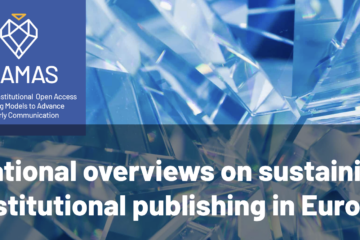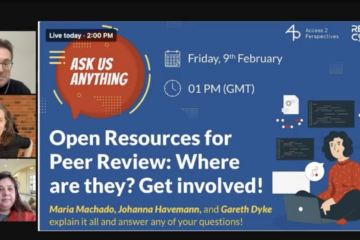Translate Science – A conversation with Victor Venema, Danny Chan and Jennifer Miller
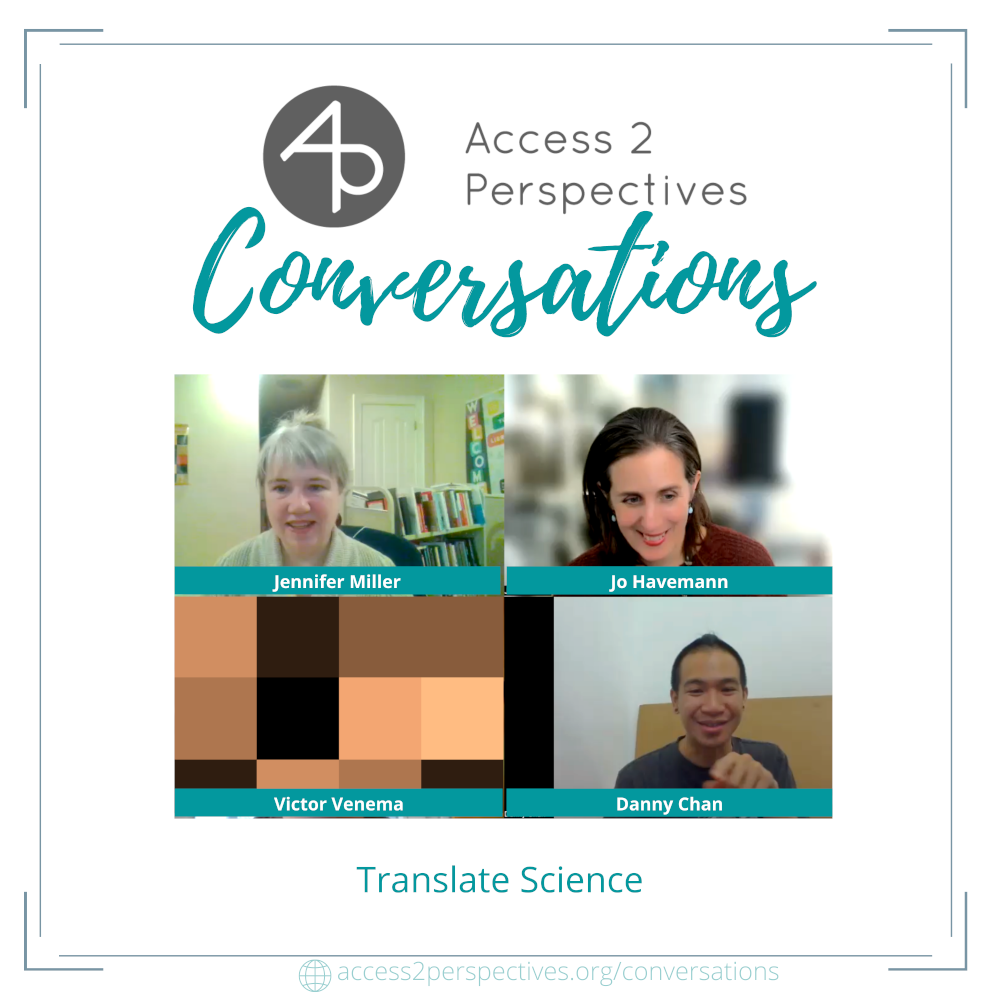
Translate Science is a working group that wants to exchange information, lobby, and build tools to make translations of scientific articles/reports/books, abstracts, titles, and terms more accessible and (thus) stimulate the production of such translations.
Read more about our work at translatescience.org
We recorded this episode in mid-November 2022. Shortly after, in late December, we were notified of Victor’s sudden death. It is therefore with heavy hearts that we share this conversation with you, however, we hope his words can inspire you to agree with us on the importance of multilingualism in science and the opportunities translation of selected research output can provide for the global society.
In memoriam of Victor Venema: blog.translatescience.org/in-memoriam-of-victor-venema/
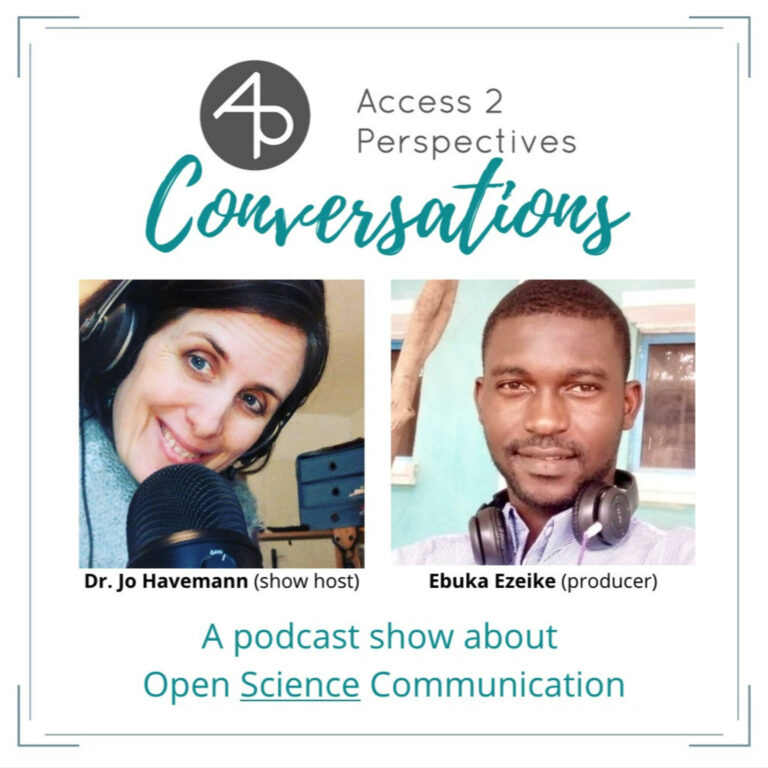
Bridging Academic landscapes.
At Access 2 Perspectives, we provide novel insights into the communication and management of Research. Our goal is to equip researchers with the skills and enthusiasm they need to pursue a successful and joyful career.
This podcast brings to you insights and conversations around the topics of Scholarly Reading, Writing and Publishing, Career Development inside and outside Academia, Research Project Management, Research Integrity, and Open Science.
Learn more about our work at https://access2perspectives.org
Translate Science is a working group that wants to exchange information, lobby, and build tools to make translations of scientific articles/reports/books, abstracts, titles, and terms more accessible and (thus) stimulate the production of such translations.
Read more about our work at translatescience.org
In memoriam of Victor Venema: blog.translatescience.org/in-memoriam-of-victor-venema/
Explore all our episodes ataccess2perspectives.org/conversations
Host:Dr Jo Havemann, ORCID iD 0000-0002-6157-1494Editing: Ebuka Ezeike
Music: Alex Lustig, produced by Kitty KatLicense: Attribution 4.0 International (CC BY 4.0)
At Access 2 Perspectives, we guide you in your complete research workflow toward state-of-the-art research practices and in full compliance with funding and publishing requirements. Leverage your research projects to higher efficiency and increased collaboration opportunities while fostering your explorative spirit and joy.
Website: access2perspectives.org

To see all podcast episodes go to access2perspectives.org/conversations/

(deceased)
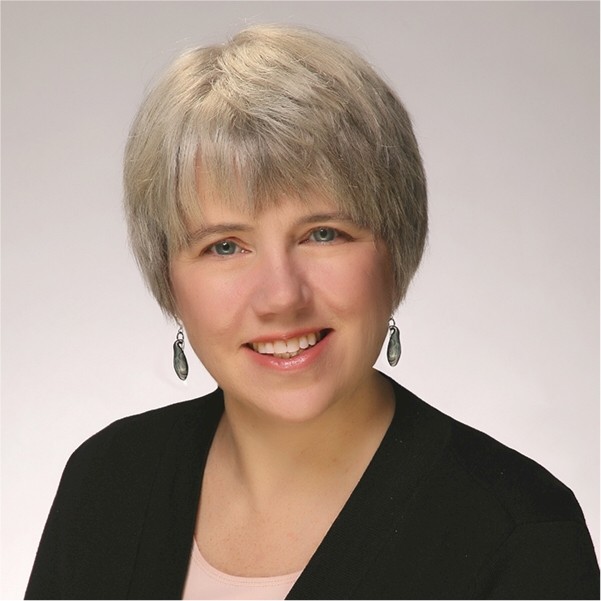
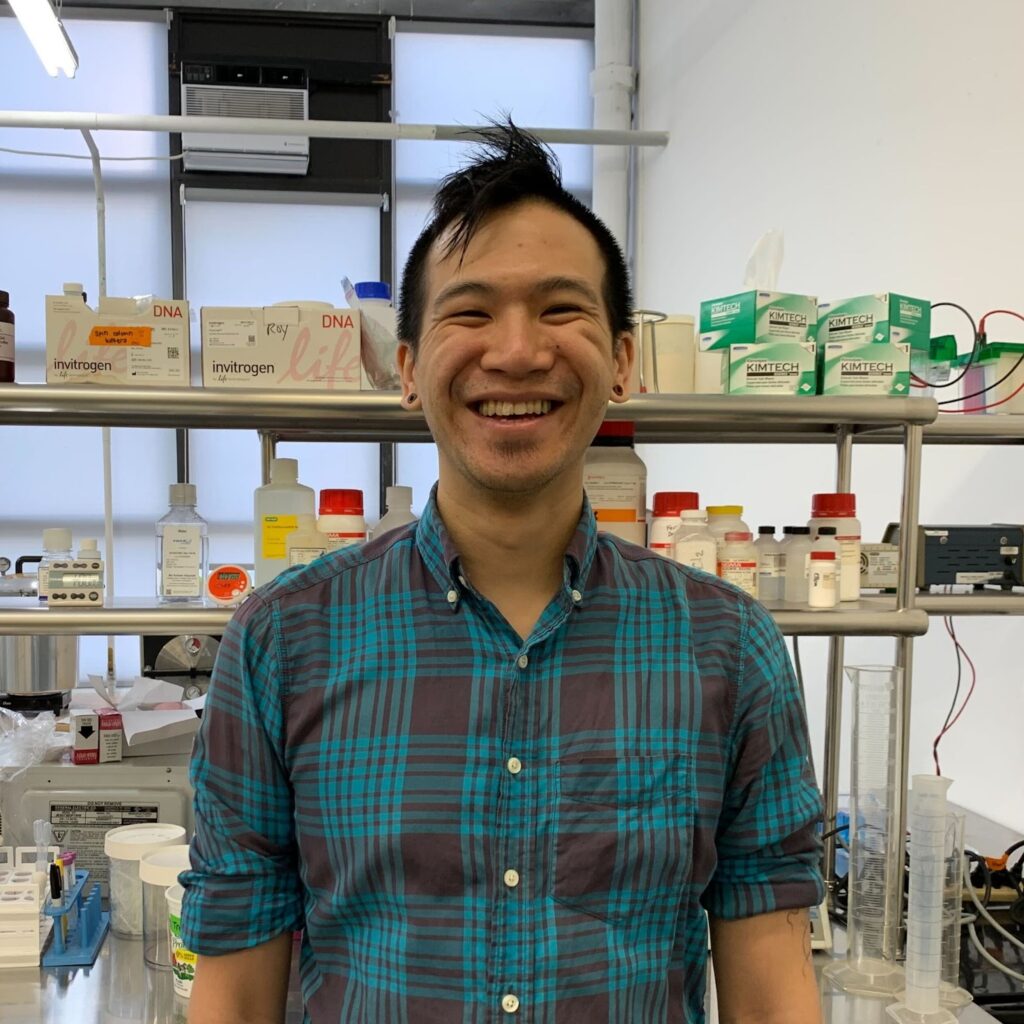
Mastodon: fediscience.org/@VictorVenema
Twitter: @Grassr_Journals
Matrix chat: @viv:datenburg.org
Codeberg: Venema
GitHub: VictorVenema
ORCID: 0000-0001-5459-6733
Linkedin: /in/jennifermillerpublicpolicy/
Mastodon: JMMaok@mastodon.online
ORCID: 0000-0002-8082-2316
Website: danwchan.ca
Twitter: @id_EATER
Mastodon: scholar.social/web/@danwchan
Linkedin: in/danwchan
Youtube: Defectivebrayne
Translate Science community profiles

TRANSCRIPT
Jo: Hey and welcome to another episode of Access 2 Perspectives conversation. I’m super happy. So we’re here today with three of my favorite people. All people that you meet on the podcast are favorite people of some sort. We’re here today with Jennifer Villa, Victor Venema, and Danny Chan talking about projects that also others in the community are very passionately working on, and it’s called Translate Science. So welcome Danny, Jennifer, and Victor. Good to have you.
Victor: Hello.
Danny: Thanks for having us.
Jo: It’s a pleasure. So, starting with Translate Science, I’m trying to remember when it started. Was it one and a half years ago? Or almost two now? Victor, could you give us a quick introduction about what was the starting point? And I think we all have been involved in multilingualism for academia initiatives, projects. I’ve been thinking about it in several contexts, but what gave rise to what we now work on as Translate Science. And then later we’ll also talk about what resources have been brought together on the website. But Victor, please introduce yourself.
Victor: I have a reasonably nice transition story. I used to work on Clouds, which is all done in English, and I never gave it any thought of publishing in English. And I think many of my colleagues are still this way. But for the last ten years I’ve been doing Climatology, studying weather stations from all over the world to see how the climate has changed. And then you really need to collaborate with people from all over the world, many of whom do not speak English. And then at a workshop in Peru, which was mostly in Spanish, I really noticed how it is to be on the other side because there was hardly anyone to talk to, but they were doing wonderful science and this is really important to connect with these people. So that’s when I started thinking about the importance of language. And I had a colleague there who regularly translated English articles into Spanish to make them available to their colleagues, and that’s when I started thinking about the importance of translation from that moment on, I started collecting resources and people behind those resources. And then I think, like you said about two years ago, I simply wrote an email to all the people I had found in those times and asked them whether they would be interested in some sort of initiative to promote translation of scientific articles.
Jo: Thank you. So you invited us by email. I remember that email so vividly. And maybe we just go around for Danny and Jennifer, what is your connection to translation of research output for multilingualism in academia? Danny, do you want to go next?
Danny: Sure. So I think maybe I found the group a little less than a year ago and I found it through just browsing the Internet on the seta verse. And I was attracted to it because I’ve been having discussions with some members of Biotechn without Borders who are community scientists or like, science enthusiasts. Maybe especially like in the mushroom growing community, people were talking about looking for literature inside of Korean journals and trying to bring those lessons into their practice. I felt like this would be a good group to engage those discussions and figure out how I could enable science that’s being done in other languages to move over, to be translated for folks that are maybe not necessarily creating published works, but are like practitioners in their own world and looking to the diversity of literature that’s out there in order to learn certain lessons and and yeah. So I started coming to the meetings and I’ve been slowly understanding how this group comes together and I’m excited to see where we go with that.
Jo: The community is a core team to keep things active and then engaging everybody in the community once in a while has opportunity and capacity love. Yeah. But it’s a lovely community to be in, and for me it’s astonishing, even if I cannot attend each and every meeting, but the amount of resources are being collected and discussions that we come up with and also through the exchange, the amount of events that we learn about around the topic of translating science. Yeah. Even though it’s still a niche topic, approximately, I would say, or it deserves much more light than it gets currently, but there’s still a lot of initiatives that we keep running into and learning and hearing about amongst each other and trying to disseminate further through the work in the group. Victor.
Victor: Yeah. I wanted to say that Danny might be quite typical for the second wave having found us on the Fetty first. It’s a really nice, constructive group with lots of activists and I think quite a number of people found us that way.
Jo: Yeah. Many more will find out that way. Now that the other network is collapsing.
Victor: I am operating mustard on a server for a scientist and it has completely exploded. We used to have something like 100 people and now it’s already over 5000.
Jo: Wow. Okay. And what to come? It’s a continuous transition. And Jennifer, what’s your connection?
Jennifer: Yeah, thanks. My background is in teaching and doing research in public policy, and specifically within public policy, science and technology policy. So recently I’ve been focused on a lot of open knowledge movements like open education, open data, and especially open science as well as civic technology. So I developed an online course. I call it The Open Syllabus for Teaching Open Science through the UNESCO recommendation on open science. And that got me, I’ve read everything, every reading recommended on that syllabus I read recently and got me really reflecting on the international nature of open science and also the various issues of language justice. And I’m very interested in the question of what are the roles of different sectors in multilingual science. So what is the role of markets, what is Google just going to build a machine to automatically translate? And what is the role of governments and then is there a role, for example, for civil society, philanthropy, volunteerism? I think I learned about the group from hearing Victor speak at one or more online conferences. And thanks also for the reminder about the Macedon server because I think it’s time for me to switch instances and I’ll be checking that out soon.
Jo: Yeah, same here. I’ve been trying to set up or find one as well, but yeah, coming your way and it’s good to know that you have your own that we can all jump on if capacity allows or as long as; you mentioned the Open science recommendation. But, victor, please.
Victor: I was thinking there might be two more members of the group who have interesting stories illustrating what we are doing. One is Dasapta from Indonesia and he is especially interested because he wants to make science more accessible to people from non English speaking countries to level the playing field. And another member is Ben from America and he is especially interested in making sure that people do not ignore all the scientific findings we already have in other languages. So he’s working a lot on turbulence, which is a field where Russia is really strong and there’s so much scientific literature out there in Russian. And if you ignore that, you’re doing less good science and you do double work. So those are also motivations for translation.
Jo: Yeah, that’s also something that I heard from my colleague who is an American studying linguistics in Germany and she mentioned to me that she thought she was studying a niche project. Very much so. She thought she was the only researcher on this very planet studying it. But obviously unconsciously, or consciously she only looked at English speaking literature about that research topic and then she ran into or was directed to a Russian article from a couple of years ago on the very same topic. And that basically changed the whole dynamic of a research because I think that’s an assumption for many researchers wherever in the world for many of us who now think we have to publish in English and then ignore all the research output in other languages. Even though most researchers, I don’t know the ratio, but I would say still most researchers are nonnative English speakers. So we all have to learn English and practice English and learn how to communicate and then we also forget or we unlearn to look into the research output in our mother tongues and that’s quite a failure and vice versa. Jennifer: Oh, yeah. Danny, please.
Danny: I just wanted to add to what Victor was saying because Ben is someone who I have been in many meetings with through the course of translated science. And I think that’s also a very interesting stakeholder because he’s coming from a Patent Office background and seeing that it’s very interesting to see all the different stakeholders, I guess, that are involved.
Yeah. I just want to say that something that I’ve learned through my time with Translate science is sort of all the different stakeholders that have something to gain by the initiative of translating science more broadly. And specifically, this was catalyzed by seeing Ben’s work in the Patent Office. And so there are many different people that would like to interact. When I think about people that are benefiting from translations, I’m thinking about my community, English speaking mushroom cultivation or whatever within this DIY science community. But there’s so many that stand to gain something from having the work translated and more widely accessible. And I think that’s been a very educational and interesting takeaway that I’ve gained from participating in this group.
Jo: Yes. Is it also that many patents are being written in the respective language in the respective countries? So there is also a lot of knowledge captured there which is still openly described in another language but can be used for research, not necessarily for implementation, but allows for communication between different stakeholder groups. Victor?
Victor: Yeah, so in my field, a lot of information on how climate measurements were made are in the national language. The scientific publications are typically in English, but if you really want to go through the details which you need to make accurate assessments of how the climate changes, then you typically need local language skills for the translation.
Jo: Makes a lot of sense. I also just currently run a course over six weeks where several people are working on biodiversity and need for the research, need to interact with the local farmers in Germany and they’re not necessarily German researchers. So there’s also a language barrier there if people come from wherever in the world to another country and then do research on a regional level, on a local level. That’s also what I heard and it was so sad to hear how almost ignorant academics can be. I wouldn’t blame the PhD student. But how? Like some research is being sent to countries without even bothering to learn the language and get to know or get in touch with the local communities and stakeholders. Just doing research from a kind of perspective and then making conclusions and assumptions based on their observations when they’re only visiting for a super short amount of time. Where those of us who probably worked or knew that I’m not the only one. But with the experience I had as an Arasma student and I’ve lived for two years in Sweden, it takes years to get to know our culture and the constellation of a society and learning to read and understand what you see. So that’s almost non scientific. As an approach, if you do research on a local level without engaging in the respective language also, or expecting the stakeholders locally to learn English so that we can engage with them, it’s sometimes possible, probably if you’re lucky in certain countries, but in others, why make that assumption? So I also thought if a researcher makes a commitment to move to another country for a research project, then it should be a default package or piece of the package to of course learn the language and then also some output is being disseminated in that language. But how difficult is that then, like on a human level, to learn a language in a short time frame, to really understand it, to adapt to what research demands? Will that make sense? I mean, it’s very personal, I guess, like from a personal constituency or how easy it is for any of us to learn a language, but maybe it’s also very technical and can not be measured. Like can we make assumptions of what’s needed to learn a language or I think it’s also part of knowing that that’s also part of the resources in the Translate Science project. How can we materialize multilingualism and academia or translation of research for various purposes? What tools and workflows do we have at hand that we’ve observed and collected and cannot disseminate further? Who would like to speak to that?
Victor: Hard question, but I guess it depends a lot on the field. In my case, I think I just need quite rudimentary German to be able to interpret all the information on how German vegetation would have changed. You have a bill for a new instrument. Probably the instrument changed. There’s not much subtlety there. In other fields you might really have to be able to communicate very well with local people and understand how they are thinking. So I guess it depends a lot on the field.
Jennifer: Yeah. One of the things that really interests me is the role of technology in our multilingual communication and how it creates the potential to kind of shift the expectation in interesting ways between the producer of the communication and the consumer of the communication and who should be bearing the burden of moving from one language to another and how much of that should take place within the mind of a person and how much of that we can use a tool like a technology to carry out. I think it’s important to be mindful of what are the power dynamics in those interactions and who has access to the technology and then also the weaknesses and biases that might go undetected when you use technology to translate, but it really has the potential to just transform our abilities to interact around the world.
Jo: Yeah, I agree, and in all the conversations that I’ve had in courses with you guys and in various contexts, I think the common agreement was, yes, we can use machine translations to support the process and to gain primary access to the content. But then to accurately translate translation is rather also to be classified as its own publication because with the assumptions and the resource of pre existing knowledge in that other language, culturally derived is more of an interpretation into another language. Also probably research topics specific for some topics more than for others. But language is used to embed information and the embedding of information uses phrases and phrases are usually culturally derived and have meaning. And some phrases can be translated to the one, others not. So you need to find what’s the words, like you cannot just want to translate from English to another language in many cases, but you need to find what other phrase in another language would basically carry that meaning for the piece of information that we want to transfer here, just by what’s the technique called. Like if you rephrase even in the same language, it often happens that you bring in your own assumptions and your own experience into other people’s research claims or findings and they will alter the results. And that’s okay. I think that’s also part of the scientific discourse process. I just feel that we need to be aware that there might be a change of the outcome to a certain degree. I don’t know. So basically my question is and that’s just a food for thought, kind of maybe for a few minutes discussion if you agree, do you agree or disagree, basically, what else can we say?
Jennifer: Yeah, I think it’s interesting because if you think about it, you and I, if we’re speaking from different first language positions, we’re conversing in English, or if we were to converse in another language that we both speak just because there’s no computer involved. I don’t think that means that the process that you’re talking about can’t happen because language kind of prepares us to understand things in different ways. And when you bring in the computer and the automatic translation, you don’t really know what you’re bringing in. You are bringing in some kind of a third party and in fact, even like a whole host of parties that were part of whatever data set was used to train the automatic translator. You don’t know what you’ve brought in. But the existence of a machine translation, we kind of can’t ignore it. We don’t want to rely on it overly. And so I think that the role of that is really critical. But the ability for people to talk past each other honestly is even true of people who speak the same language from birth. Humans are very good at misunderstanding one another and we’ll probably continue to do that as long as there are humans.
Jo: Yeah. Also, I didn’t want to bring this into the discussion to find arguments against translating research, rather just to be aware that there are certain degrees of interpretation possibilities and machine translation is as we already say. I mean, can support that it is probably not for sure not as fine tuned as human to human interaction and translation, even though the vocabulary might be missing. But human interaction allows for filling the gaps more than what a machine would be capable of.
Victor: So I see machine translation especially as a really good labor saving device for many language pairs. Machine translation is already quite good and if any human goes over it and corrects the last mistakes, you make a translation much more efficiently than when you would do everything from scratch. And I think that opens up an entire world of volunteers translating articles where in the past it would have been a quite big job to translate an article. You can nowadays do that in just a few hours and that makes it much more attractive as a contribution to your scientific community to make a translation. And maybe I can add we also have a blog as Translate Science and I think the last blog post was about some of the typical errors machine translation makes. And if you’re a human correcting such a machine translated text, those are things to watch out for.
Jo: I also think, like how preprints nowadays fill in a gap in the publishing workflow by allowing versioning and research output to turn into a living document that can continue to live as long as there’s funding for the research to be done by one in the same group. And I just feel that with translations, if we treat them like preprints and they can be generated as a primary translation and stay open for comments, optimization, reinterpretation and correction basically by the community, then we might have a good chance to get as accurate as possible translated versions of research output by acknowledging everybody’s contribution and also being then able to learn about regional specificities in how people from different parts of the world interpret certain research content.
So, Victor, you mentioned the blog and the blog is really like many gates for the resources that are in the Wiki now to be found. When I checked the last quite exhaustive narrative of the history of translating science, which I wasn’t aware of, where I think what really blew my mind is that translation of research, I mean, not so mind blowing if you think about it. Of course, like 50 years ago or longer, 70 years ago it was pretty common that there were many researchers who were by default bilingual to be able to communicate their outputs to another community. Maybe not every researcher, but those who were successful and internationally renowned. Do you want to elaborate on that?
Victor: Yes. So something like only 100 years ago, I think it was a quite common part of a PT thesis in America to translate a foreign language article into English. That was a skill that a PT student was supposed to have and to demonstrate by making a translation.
Times really have changed and then in the Second World during the Cold War, sorry, there were quite a lot of professional translations being made to make sure that Western science kept up with what the Soviet Union was doing. So it was a bit one sided with just two languages in most cases, what they were doing. But that was an enormous operation, an enormous amount of translations being made.
Jo: I’m also thinking of what we discussed earlier, Jennifer, you mentioned translating research as a form of open science. I think it should be added as one of the pillars for the open science principles because language barrier or the language barrier is a closed gate, basically, as we all experience in either direction. But maybe it’s not as if it is system driven as we are criticizing our system which hampers scientific freedom.
Jennifer: Yeah, I would love to see more attention to language issues in open science and there are so many ways where that can be done, whether it’s giving scientists access to develop foreign language skills or use of technology, production of translation even. I think there’s space in making more readily available or funded or supported proofreading skills because for example, I feel fairly proficient in Spanish, but I know that if I were to write an academic paper in Spanish, there would be grammatical problems that I don’t usually have in English. It would be a real challenge for me to do that. And fortunately, there’s never been any real pressure on me to produce an academic paper in Spanish. But people in all fields feel pressure to produce their academic papers in English and mostly they can get the main ideas across. But one thing that does interest me though is they don’t need to get their ideas across just to English speakers, but they’re using English to communicate with people who have learned English coming from many other different languages. And I haven’t seen actual data on this, but intuitively it seems to me that people will have that that will work better if there’s real attention to the consistency of the English document that’s produced that. Someone who starts from Spanish translates to English, where they tend to make English grammar mistakes might be particularly confusing to someone who learned English from Arabic or from Chinese or a language that’s very different from Spanish. So I think that that’s a space. And of course there are automatic grammar checking programs in English as well, but for scientific documents, you probably don’t want to just let those go unsupervised.
Jo: Yeah. So yeah, the human factor is very much appreciated. Victor?
Victor: So I’m Dutch and we basically learn English from television as young kids. So we are relatively fluent but still have probably produced many grammar mistakes and have a limited vocabulary when we used actively. But still it’s relatively good. And my impression is when I read the scientific literature that when somebody writes really good English there are much more likely small mistakes in the article. So my impression is that peer reviewers are much less vigilant when they can smoothly read a text than when they read a text by a non native speaker, which would be a barrier to entry for non native speakers. I don’t know how to see that but it’s of course hard to quantify. But I have a feeling that well written articles are typically the ones with the most small mistakes.
Jo: Again, from my experience in the scientific writing courses, that the ones. Or there’s also research about reviews and editorial boards or reviewers rejecting or suggesting for rejection if the English is not good enough. And that’s usually what many nonnative English speaker authors have to deal with, where the reviewers want to look at the results section to see if the research itself is sound. And sometimes they can be picky about commas or not in the right place or whatever, where there’s no actually comma rules, just recommendations because these are fluent statistic tools. And the other thing I wanted to mention is that for proofreading in nonnative English research or setting research institutes is usually the handful of native English speakers who have to do all the editorial work before a paper is being submitted that can end up for a whole lot of volunteering. Victor?
Victor: So for my PhD I had really good luck. I was at Delft University of Technology and my faculty, they had a translator to do proofreading and that really made the articles a lot better. In fact, he even sometimes made really good comments on the science but especially the language. He was much more fluent and I guess the university did that to get more published, more papers published.
Jo: Sure. Yeah,
Victor: That’s a bit of a cynical motive maybe, but still I wanted to mention it in the hope that more universities do this. It really helps a lot.
Jo: Yeah, I read somewhere that wouldn’t that however add an imbalance because it adds for more budgeting like you would have to budget and pay that service. You can also nowadays pay publishers to do that for you and they probably overcharge, I would suspect, or some of them, maybe not the university presses, but certain corporate publishers will probably do that. And then there’s independent services, one of which was also represented earlier in this podcast with Avi Staiman academic language experts. There’s a handful of such services popping up in the landscape, which is good, but then they also further increase the imbalance in available budgets for non native processes like English speaking country institutions.
Jennifer: Yeah, I think this is an area where it’s really important to think about the resources and power balances the access to resources. And it’s a place where I do think we need more than one piece that we haven’t brought in here yet. And I know you all know this, but most peer reviewing that’s done is uncompensated, right? So even if you were having a discussion about language, if we had a bunch of academics and we’re talking about the peer review process, one of the things that would come up right away is that almost always this is unpaid work. And to me it does seem that it’s a lot harder to ask someone to do an unpaid review of an article that’s not written clearly. You think about where you’re in the process? Does it make sense to improve the language and it might make sense to improve the language before it goes to peer review, because how rigorously can someone really peer review something if they’re having a hard time understanding it and it’s unpaid work on top of their already, you know, false plate of commitments that academics have? So the system that Victor described as being available to him seems like a really great system. But are we making that type of support available to the people who aren’t already doing well resourced science?
Jo: Yeah. As you were asking that or mentioning that I was just running a few scenarios in my head and I was thinking, well, then maybe well, we would need preprints for research by non English speakers to be written in their mother tongue translated into yet another preprint version/translation of that article, and that then being community commented again. It would still be volunteer efforts or people who are most likely unpaid positions but need to carve time out of their overcharged research schedule and workloads to comment on. But then the workload would be distributed amongst many shoulders and not sitting with one or two. But then Danny, what are your thoughts on that? It’s a bit of a dilemma and who’s paying for that service? And can it not also be a default story just to add that because you’re also American sorry, Jennifer and Danny. Or native English speakers for that purpose, would you mind having, by default to translate, even though you publish in English and speak English as a mother tongue, would you mind by default generating a translation of the summary or the whole research article that you produce? Just as much as nonnative English speakers would have to like, I think to have that as a default, bilingual by default would for once put everybody in the same position and second would help democracy and openness or lower one language barrier at least. Okay, Danny, this is your goal. Good luck.
Danny: Something that this line of conversation is reminding me is that the reason I think we come together as Translate science is to advocate for these translation issues and to think through them. And what Jennifer was saying, maybe it might even just extend to the. Way in which we write in English is that there are easier formats, there’s more legible ways to write that make it more amenable towards translation. And so that’s something that has to be thought of as well in terms of who should pay. I think that this is like again, this goes into the advocacy part of our translation initiative is being aware that there are power dynamics at play means that when we ask for change, we have to not put the burden on individuals that maybe have previously been shut out from the power structures that exist inside of the scientific academy. And I guess I don’t know. Right. I think at the end of the day, I’m not really sure, and that’s why I’m here with this group, is to talk this through collectively so that we can recommend actions. And I think the structure in the way that we’re set up right now, and I’m hoping this will also change as we continue to grow together, is that we can put these perspectives in blog articles published on our website. We’re maintaining a resource, a wiki, where people can read through the discussions that have been had as a group and then perhaps find ways to contribute their thoughts into this ongoing discussion. So I hope that’s not too much like just nothing that I said. Kind of nebulous, but I am trying to tie together some of the different points that I’ve come across here, maybe in a way that would be useful for a listener to hear.
Jo: Yeah, it’s perfect how you say that, because it also reminds us that we’re not here to provide all the solutions. We are giving incentives and proof of thought unsensitized, really. That’s, I think, the main mission. They also said to sensitize the community at large about the issues that we see and experience with the lack of translation efforts. Jennifer.
Jennifer: yeah, I would say that personally I would love to produce a Spanish language summary of my research. Personally, I would have found that delightful. I’ve written a few pieces of data journalism for a website called Apolitical, and they routinely translate everything into French and Spanish. So I actually do have a few things that were published in other languages, but in terms of how it would go over in the US. Specifically, our PhD programs are removing foreign language requirements. So to the extent I think that well resourced, people would probably have departments that would translate it into the most citation advantageous language. For example, I work closely with a lot of economists and they tend to maximize their returns on everything they do. So they would look and they would probably just purchase in bulk the ability to translate their abstracts into maybe German or whatever they saw as the next most advantageous language for their research, and they’d be done with it. And I’m not sure if that would be that might well be better than where we are right now, but you pose a really interesting question about the many ways it might play out.
Jo: Victor, you pretty much suggest, and we are Democrats if you decided to put the website onto Wiki and design it as a wiki so it has the potential to be cross translated. And what I like about the designers of Wikipedia wiki data, all these wiki, wikimedia projects, is that they are designed for multilingualism and for networking, for intersectional knowledge and data exchange. Or is this a vision where we can I mean, we had a conversation also with people from Wikimedia. So thinking about, okay, where is Translate science going next? Like what’s our mission? And I’m asking you as a driving force behind the project in terms of interoperability with other systems, in terms of functionality and feasibility for utilizing and facilitating the knowledge and data exchange across sectors as well, and primarily also across languages technologically facilitated.
Victor: So Wikipedia, I don’t know whether they are designed for multilingualism. Basically every Wikipedia version is its own separate home page. Now it’s working on stuff like abstract Wikipedia where you would write the one article once, but then in a way this can automatically translate it in many languages. So Wikipedia is really active when it comes to multiple languages, but I’m not sure whether they are designed to do that. And it’s a really wonderful global group of volunteers. And in that way I think it could also be an inspiration for the system we are currently thinking of designing to translate abstracts. Maybe Jennifer can talk a bit more about that.
Jennifer: Yeah, I’m going to just speak really briefly here about something that we hope to explore further in the coming year. But I’ve drafted a process that we’d love to get feedback from multiple perspectives on with the idea that there may be a role for volunteers to translate abstracts in a way that maximizes their availability. The process would start with authors volunteering to produce a structured summary, like a structured abstract of their paper, where and nominating it for entering into our volunteer translation process. We would prioritize translating papers that exemplify good open science practices. But then once the paper was accepted into the process, we would work starting from a machine translation and then with volunteer human reviewers, produce what Danny had mentioned, the fact that you can word things in different ways to be more amenable to translation. So the proposal as it’s structured right now, uses English as the sort of central language from which other translations would be produced. So someone might, they would write their paper in their chosen language, perhaps Spanish. Then they would write a structured summary in Spanish, make a first attempt to translate it to English using machine translation, and then that’s where the authors would give it one more review to see if there were any obvious problems with the machine translation. Then their abstract sort of first draft English would enter our process. The volunteer translator would review it for mistakes in English as well as constructions that were unnecessarily complicated. And then once we had this international English or global English structured abstract, we would publish that as a document in a platform such as Zenodo. And then it would be available for people who speak other languages fluently to translate from English into their home language. And the idea there would be to focus on people translating into their most comfortable language. So that’s what we’re looking for feedback on at this time. I’m sure there are refinements that we’ve already gotten a lot of good suggestions to help adjust this process, but we are excited to see what might develop.
Jo: Excellent. Thank you so much, guys. It’s been enlightening. Also for me again, it’s so nice to have such opportunities to talk like we have on the bi weekly, currently meetings, community meetings. We will place the links obviously to the website, the wiki, the blog page and master loan where you find us and we can follow us. You can also join us if you would like to join the community and help us brainstorm ideas around multilingualism and translation of research output. Any last comments before we jump off? Just a quick run.
Victor: Maybe one more last big project next to the translation of abstracts. We are also building a system to make it easier to find translations, such as a database where you can put in an article and then see where there are any translations.
Jo: Thank you. Okay, Danny. Okay. Because Jennifer also needed to jump, I think we could just call it a conversation. Thank you so much, guys. We’re touching on almost all of the issues and opportunities and there’s still a lot to explore. It’s been exciting. Thanks for making time for this.
Victor: Thank you. And everyone is welcome to join us.
Jo: Yes, we’re looking forward to seeing many new faces on the big blue button world and petty verse. All right, thank you.
Victor: Bye.
